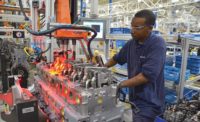"Quality improvement will result from people improving their processes and from management improving the system," says Thomas Pyzdek, ASQ Fellow.
Improvement occurs when the processes allow for change. But, the processes won’t improve without the people making the effort to change them. While improvement is the job of the quality “people,” it can often feel that it always falls on your shoulders. The burden gets tiresome but not insurmountable. At these times, the best action is to stand up and be heard. Or, as Brenda Fisk, director, project management office, Software Quality Solutions, offered during an interview with ASQTV: “Get involved. Get involved right now!” She was addressing her response directly to new quality professionals, but these words are also applicable to quality veterans.
The quality profession has existed for nearly three-quarters of a century. In 1946, quality professionals rallied together to create the American Society for Quality Control. Throughout the association’s 68 years, the profession has evolved as roles and responsibilities have changed and expanded. In the early 21st century the quality practitioner had been firmly planted into the quality community as it became clear that, for organizations to thrive, quality professionals couldn’t work in a silo away from other, traditionally “nonquality” departments. To survive, quality must become everyone’s job.
The statement on its own—Quality is everyone’s job—has the look and sound of a slogan, a rousing, easily remembered and repeated phrase. The fact is, according to ASQ’s past three research studies—The Future of Quality (2015), The Global State of Quality (2016, with APQC), and the Culture of Quality (2017, with Forbes Insights)—organizations have been making attempts to break down silos and get tools into the hands of everyone. The change can be painfully slow. It is a culture shift. Those outside of the traditional quality profession are asked to do “one more thing,” while the quality professional is left to question job stability. But there is a great need for the quality professional’s skill set. To make “quality is everyone’s job” a reality, the subject matter experts, the quality professionals, need to offer guidance and support every step of the way. The benefits can be many.
“It’s a lot more collaborative than it used to be,” says Laura Methfessel in an ASQTV interview. “I’ve only been doing this for seven years, and when I started at my company quality was still seen as (one) of the bad guys. But since [then], and since I’ve been able to train through ASQ, I’ve been able to take all those skills and bring them to our corporate culture. And now we have cross-functional groups. We are helping to promote quality basically from the bottom up and getting all our employees involved. And that’s how I see quality work going throughout the whole company, making everything work better.”
Breaking down the silos is good for communication and business. It gets people teaming together, problem solving in more effective and efficient ways. When quality departments move effectively around to other departments, matters go smoother and quicker. These organizations have—or strive for—a culture of quality.
“Generally what I have found is that when we think about quality, it is a very narrow understanding about quality in a manufacturing environment,” says Jigar Vadia, senior manager of strategic initiatives, KYB Americas Corp. “Generally when thinking of quality, it is getting a customer issue, doing root cause analysis, and do[ing] corrective actions, which is an extremely important part of quality but not the only part of quality systems.”
Vadia continues to say in the ASQTV interview that you need to broaden your thinking to process quality. This type of thinking doesn’t usually start at the top, it comes from the quality professionals. Quality professionals have control in these areas to broaden their areas of expertise and value to the organization.
There is plenty for the quality professional to learn. At the recent ASQ Quality 4.0 Summit, held in Dallas, attendees heard about many opportunities quality professionals have to help their organizations maneuver the challenges of cybersecurity, artificial intelligence, and robotics. Speakers stressed that quality professionals don’t need to become robotics engineers to navigate their companies through the future of business, but they do need to have working knowledge of the current and upcoming technologies that face organizations.
Leaders need assistance to keep their organizations relevant—and in business. Quality professionals—the people with improvement skills and knowledge—have the opportunity to orchestrate that assistance.
Go, quality professional, learn, share. Improve yourself, improve your team, improve all.






.png?height=200&t=1720480765&width=200)


